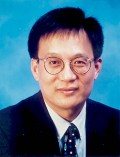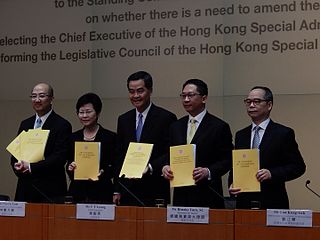
The Legislative Council of the Hong Kong Special Administrative Region (LegCo) is the unicameral legislature of Hong Kong. It sits under China's "one country, two systems" constitutional arrangement, and is the power centre of Hong Kong's hybrid representative democracy, though popular representation in the legislature has diminished significantly in recent years, along with its political diversity.

The Democratic Party (DP) is a centre-left liberal political party in Hong Kong. Chaired by Lo Kin-hei, it is the flagship party in the pro-democracy camp and currently has 7 elected representatives in the District Councils.

The 2004 Hong Kong Legislative Council election was held on 12 September 2004 for members of the Legislative Council of Hong Kong (LegCo). The election returned 30 members from directly elected geographical constituencies and 30 members from functional constituencies, of which 11 were unopposed.

In the political systems of Hong Kong, a functional constituency is a professional or special interest group involved in the electoral process. Eligible voters in a functional constituency may include natural persons as well as other designated legal entities such as organisations and corporations.

Elections in Hong Kong take place when certain political offices in the government need to be filled. Hong Kong has a multi-party system, with numerous parties in the Legislative Council. The Chief Executive of Hong Kong is nonpartisan but has to work with several parties to form a coalition government.

Legislative elections are held in Hong Kong every four years Legislative Council (LegCo) in accordance with Article 69 of the Basic Law. Legislative elections are held either at the expiry of a four-year term or when the Chief Executive dissolves the legislature and calls a new election.

The Hong Kong Island geographical constituency was one of the five geographical constituencies in the elections for the Legislative Council of Hong Kong from 1998 to 2021. It was established in 1998 for the first SAR Legislative Council election and was abolished under the 2021 overhaul of the Hong Kong electoral system. In the 2016 Legislative Council election, it elected six members of the Legislative Council using the Hare quota of party-list proportional representation. The constituency covered all the four districts on the Hong Kong Island, namely, Central and Western, Eastern, Southern and Wan Chai. In 2020, it had 707,277 registered voters.

The Kowloon West geographical constituency was one of the five geographical constituencies of the Legislative Council of Hong Kong from 1998 to 2021. It was established in 1998 for the first SAR Legislative Council election and was abolished under the 2021 overhaul of the Hong Kong electoral system. In the 2016 Legislative Council election, it elected six members of the Legislative Council using the Hare quota of party-list proportional representation. It had 602,733 registered electorates in 2020. The constituency corresponded to the districts of Yau Tsim Mong, Sham Shui Po, and Kowloon City.

In Hong Kong, geographical constituencies, as opposed to functional constituencies, are elected by all eligible voters according to geographically demarcated constituencies. There are currently 5 geographical constituencies in Hong Kong, returning 35 members to the Legislative Council. Following the 2021 electoral reforms passed by the Standing Committee of the mainland National People's Congress, the number of members returned by geographical constituencies would be lowered to 20, while the total number of seats in the Legislative Council would be increased to 90.

Democratic development in Hong Kong has been a major issue since its transfer of sovereignty to the People's Republic of China in 1997. The one country, two systems principle allows Hong Kong to enjoy high autonomy in all areas besides foreign relations and defence, which are responsibilities of the central government. Hong Kong's Basic Law, also adopted after the 1997 handover, allowed residents to vote for local district councillors and directly elect about half of the region's legislators at the time. Many Hongkongers became concerned, however, after the first Chief Executive, Tung Chee-hwa, appeared to have mishandled this issue, while human rights and universal suffrage have also become focal points for the pro-democracy camp.
The 2010 Hong Kong electoral reform was the series of events began in 2009 and finalised in 2010 under the Consultation Document on the Methods for Selecting the Chief Executive and for Forming the Legislative Council in 2012, a document published on 18 November 2009 by the Government of Hong Kong to broaden the scope of political participation and increase the democratic elements in the 2012 elections in line with the Hong Kong Basic Law.

The 2012 Hong Kong Legislative Council election was held on 9 September 2012 for the 5th Legislative Council (LegCo) since the establishment of the Hong Kong Special Administrative Region.

The 1995 Hong Kong Legislative Council election for members of the Legislative Council of Hong Kong (LegCo) was held on 17 September 1995. It was the first, and only, fully elected legislative election in the colonial period before transferring Hong Kong's sovereignty to China two years later. The elections returned 20 members from directly elected geographical constituencies, 30 members from indirectly elected functional constituencies, and 10 members from elections committee constituency who were elected by all District Board members.

The 2011 Hong Kong District Council elections were held on 6 November 2011. Elections were held to all 18 District Councils of Hong Kong, returning 412 members from directly elected constituencies, each selecting a council member. After the government's constitutional reform package was passed in 2010, five new seats in the Legislative Council would be created in which the candidates would be nominated by all District Councillors.
The 1988 Hong Kong Legislative Council election was an indirect election for members of the Legislative Council of Hong Kong (LegCo); was held on 22 September 1988. It was the second ever election of the Legislative Council in Hong Kong history based on the 1987 Review of Developments in Representative Government, as the Government's democratisation process according to the agreement of the Sino-British Joint Declaration. There were 12 members elected by Electoral Colleges, 14 members from functional constituencies.

These are the District Council (Second) functional constituency results of the 2012 Hong Kong legislative election. The election was held on 9 September 2012 and all 5 seats in were contested. The five new seats formed a new constituency under new arrangements agreed in a contentious LegCo vote in 2010, for which candidates may be nominated by the District councillors and are elected by all registered voters who are not in any 'traditional' FC, creating the largest constituency with a total of more than 3.2 million eligible electors. The vote counting system used is the same as that in the GCs: the party-list proportional representation with the largest remainder method and Hare quota.

The 2014–2015 Hong Kong electoral reform was a proposed reform for the 2017 Hong Kong Chief Executive election and 2016 Legislative Council election.

The 2016 Hong Kong Legislative Council election was held on 4 September 2016 for the 6th Legislative Council of Hong Kong (LegCo). A total of 70 members, 35 from geographical constituencies (GCs) and 35 from functional constituencies (FCs), were returned. The election came after the rejection of the 2016/2017 constitutional reform proposals which suggested the electoral method for the 2016 Legislative Council remains unchanged.

Nelson Wong Sing-chi is a Hong Kong politician and social worker. He had been member of the Legislative Council of Hong Kong between 2000–04 and 2008–12. He was the founding member of the Democratic Party before he was expelled in 2015 for his support in the government's constitutional reform proposals. He was also briefly a founding member of the Third Side, a centrist political party.
The 2005 Hong Kong electoral reform was carried out in late 2005 for the selection of the Chief Executive of Hong Kong (CE) in 2007 and Legislative Council of Hong Kong (LegCo) in 2008. The reform proposals were ultimately voted down by the pro-democracy camp.














